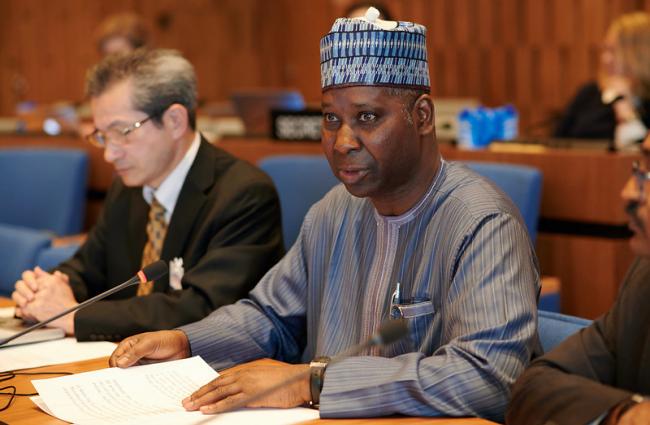
Teachers, skills for the future and policies to tackle drop-out and exclusion were priorities highlighted at the Ministerial panel held during the November bi-annual meeting of the multi-partner Global SDG-Education 2030 Steering Committee. Sixteen Ministers representing all regions shared challenges, policy reforms and funding needs to deliver on SDG4 commitments.
The President of the UN General Assembly H.E. Mr Tijjani Muhammad-Bande addressed the Committee, stating “no educational system can rise above the quality of its teacher. We must do more to ensure that we have adequately qualified teachers.”
Echoing the lifelong focus of SDG 4, he underlined the need for “more flexible pathways between work and learning and between formal and non-formal education.”
He called on countries to allocate 4% of GDP and 15% of public expenditure to education and urged donors to meet the UN target of 0.7% of gross national income to foreign aid and to direct 10% of this to primary and secondary education to bridge the funding gap.
Exemplifying the spirit of #ActingTogether4Education, the PGA stated “consider me your partner in all of your endeavours in the area of education… by striving together, we will succeed in delivering for all.”
UNESCO’s Assistant Director-General for Education, Stefania Giannini stressed the need “to scale up and accelerate action, with a more ambitious, transformative and integrated response.” She asserted the importance of strengthened global and regional coordination and ensuring that new initiatives respond to gaps and needs, carry impact at country level, and connect to the Steering Committee.
Members unanimously urged existing and emerging initiatives in education to link with the UN-mandated Global SDG-Education 2030 Steering Committee and called on all education partners to work with the Committee to advance the world’s collective commitment to SDG4.
Committee members from each region presented updates on regional coordination, reflecting how the SDG4 is being adapted to each context and taken forward through regional coordinating structures, roadmaps, commitments and policy dialogue involving all education stakeholders.
The Committee also issued a joint statement commending the Global Convention on the Recognition of Qualifications concerning Higher Education which marks a milestone in international cooperation to facilitate the fair and transparent recognition of qualifications and the mobility of students, faculty, and researchers. The Statement, delivered by the Steering Committee’s co-chair, Professor Kazuhiro Yoshida to UNESCO’s ministerial meeting on higher education on 13 November, calls for “political engagement at the highest level, stronger collective action and reinforced partnerships to realize our shared commitment and responsibility.”
The 7th meeting was also an opportunity for the Committee's working groups on inclusion and equity, teachers, skills and higher education to share outlines of forthcoming policy papers.
The working group on inclusion, led by Colombia, Slovak Republic, ABEGS and UNICEF, will produce a policy paper that will examine those most at risk of being left behind, analyse the multiple factors of exclusion and identify concrete solutions for dismantling discriminatory practices. It will argue for an integrated approach, putting emphasis both on challenges related to guaranteeing equal access to quality education and ensuring actual completion.
The working group on teachers, led by Burkina Faso, SEAMEO and Education International, emphasised that guaranteeing quality teaching in every classroom requires initial training and continuous professional development (CPD). In light of wide regional variations in the proportion of trained teachers, the group’s policy paper will examine the lack of internationally comparable data and metrics; effective approaches and models; accreditation, certification and recognition of upgrading programmes and funding matters.
The working group on skills, led by United Arab Emirates, African Union and OECD, focused on how education and training can become more flexible and responsive to new demands for skills. It is currently working on a policy paper that will present elements that facilitate school-to-work and work-to-work transition as well as describe the impact of upskilling and lifelong learning on labour market productivity.
The fourth working group, led by Norway, OEI and ILO, focused on strengthening inclusion in higher education. The group explained that despite the rapid expansion of higher education in the past two decades significant disparities remain amongst regions and within countries. As such the group's upcoming policy paper will argue that the expansion of corrective measures together with public policies, including building stronger links between secondary and tertiary level, are necessary to promote inclusion.
These working groups, set up by the Committee, aim to make strategic policy recommendations on focused subjects and facilitate peer learning.
The Committee meeting also featured a presentation by Dubai Cares on Expo 2020’s Global Education Summit (March 2021) and an exchange on the Futures of Education initiative.


